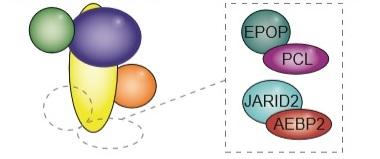
Credit: Biotech Research & Innovation Centre, University of Copenhagen
In the body’s cells, some proteins are of vital importance as to which genes are active or turned off. Now, researchers from the University of Copenhagen and the Memorial Sloan Kettering Cancer Center have discovered which proteins are necessary in order to maintain the proper genetic regulation.
All of the more than 200 different cell types in our body contain the same DNA. Which of those genes that are expressed determine each cell type. Therefore, it is essential that the activity of the genes is controlled with great precision.
Thus, a stem cell may develop into anything from a skin to a bone cell, depending on which parts of the genome that are expressed.
The researchers in Professor Kristian Helin’s research group have for several years worked to understand the mechanisms that control whether a gene is active or inactive. This research is crucial to the understanding of how cells become specialised and maintain their identity, the normal embryonic development, and how various diseases may develop.
In a new study, researchers working at the Biotech Research & Innovation Center (BRIC) and the Novo Nordisk Foundation Center for Stem Cell Biology (DanStem) at the University of Copenhagen as well as the Memorial Sloan Kettering Cancer Center in New York have achieved crucial new results.
The results were recently published in the scientific journal Molecular Cell and provide insight into the ways in which epigenetic mechanisms control the activity of genes.
‘In addition, the results may have an impact on the future treatment of certain cancers related to the studied protein complex, including lymphoma, leukaemia and a special type of brain cancer that is often seen in children’, says Kristian Helin, Professor at BRIC and Director of Research at the Memorial Sloan Kettering Cancer Center.
Turning On and Off
One of the key protein complexes that regulates whether genes are turned on or off is called PRC2. To ensure that the complex binds to the right places in the genome, a number of other proteins are associated to PRC2.
In the recently published article, the research group has studied the importance of six different proteins associated to PRC2, and the group has shown that all six proteins help direct PRC2 to the right places in the genome.
In 15 different combinations, the researchers removed the associated proteins from embryonic stem cells one by one. In this way, the researchers were able to study the contribution of each protein to the activity and binding of the PRC2 complex to specific areas. It was found that the ability to find the way to the right places in the genome remained intact until all six associated proteins were removed from the stem cells.
That finding surprised the researchers, says the study’s lead author, Postdoc Jonas Højfeldt:
‘We assumed that each of the associated proteins was responsible for its own area to where the PRC2 complex should be guided. Instead, we saw that they all contributed to the places where the complex binds. As long as just one of the associated proteins were left, the ability remained intact’, he says.
###
Media Contact
Professor Kristian Helin
[email protected]
Original Source
https:/
Related Journal Article
http://dx.




